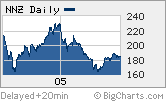 |
| "Little" love for nano: The Merrill Lynch Nanotechnology Index has slumped during the past year. |
|
|
|
|
|
|
|
NEW YORK (CNN/Money) – Nanotechnology, the science of manipulating matter at the sub-molecular scale, has gotten a lot of buzz in the mainstream media, but it's mostly been "ooh, ahh, gee-whiz" type coverage.
"Wow, pants that won't stain! Tennis balls with an extra bounce!"
For investors though, nanotechnology has yet to hit the big time. Last summer, a company called Nanosys had registered to go public and its debut was expected to usher in the nanotech age on Wall Street. Nanosys had hundreds of patents and partnerships with brand-name companies like DuPont, Intel and Matsushita. How could it miss?
But Nanosys was lacking a couple of things that increasingly choosy investors were interested in -- like products. And revenues. As a result, Nanosys pulled its IPO last August. And the few publicly traded companies in nanotechnology have struggled since -- the Merrill Lynch Nanotechnology Index has tumbled some 15 percent over the past 12 months.
So why has the sector faced such tough times?
What exactly is nanotech?
One issue for investors is that nanotech is such a broad field. Many companies are working on nanotech applications for various industries.
"When you are dealing with something as small as a molecule, there are lots of things you can do with it," said Thomas Mino, CEO of Lumera (Research), a company developing polymer compounds to be used in biotech, electro-optic communications devices and wireless antennas.
Lumera is a perfect example of how tough it's been for nanotech stocks the past year. The company went public last July and its stock has tumbled about 33 percent since. While it's small, with sales of just $240,000 in the first quarter, it lost $2.9 million in the quarter.
Matthew Nordan, vice president at Lux Research, an independent firm specializing in nanotechnology, said investors are still waiting for a private company to go public that can really capture investor's imagination. He thinks the earliest this is likely to happen is sometime next year.
Two private companies that could help break the nanotech slump are Nano-Tex, which makes stain-resistant textiles used by retailers such as the Gap, Land's End and Eddie Bauer, and Molecular Imprints, which develops lithography equipment meant to maker semiconductor manufacturing more efficient. Nordan said both companies could generate more than $20 million in sales this year.
Juan Sanchez, an analyst with New York investment bank Punk, Ziegel, agreed that nanotech stocks probably won't move significantly higher until there are more nanotech companies going public.
"There was a lot of excitement in the sector during Nanosys' possible IPO and there should be similar excitement whenever the next wave of IPOs is announced," he said.
Tiny companies, big gains?
Still, analysts said it might be a good time to start taking a look at select public names in the group. But investors need to be careful.
"The challenge for investors is that these are tiny companies with stocks that are subject to the fashion of day traders," Lux's Nordan said. "A nanotech stock can go up or down off of nothing but an announcement that a patent has been filed somewhere in Europe."
One slightly less risky way to invest in the sector is Harris & Harris (Research), a venture capital company that focuses on promising private nanotech firms.
Shares of Harris & Harris have held up much better than most other nanotech companies lately and Sanchez said the company has a solid reputation for identifying quality upstarts. "The company is well-positioned to invest in the sector. There is a direct correlation between nanotech success and success for Harris & Harris," he said.
Nordan also said Harris & Harris is a good way for investors to buy into the sector as opposed to trying to pick winning companies themselves.
But there are some other nanotech-related companies he recommends for the long-term, including tools makers FEI (Research) and Veeco Instruments (Research), and research and software firm Symyx Technologies (Research). All three companies are expected to be profitable this year.
Sanchez also likes Flamel Technologies (Research), a French biotech firm that has developed a product called Medusa, a delivery system for therapeutic protein drugs.
Still, the safest way to try and bet on nanotech, according to Nordan, is to find larger, more diversified companies that are investing in nanotech. Three in particular that he cited are 3M (Research), German chemical company BASF (Research) and Air Products and Chemicals (Research).
"There are large-cap stocks whose value could be impacted by nanotech but it's not going to cause a massive uplift," he said. The flip side of that equation is that these stocks probably won't be subject to massive volatility like smaller nanotech firms either.
For more markets news, click here.
For a look at hot stocks, click here.
Analysts quoted in this story do not own shares of companies mentioned. Punk, Ziegel has done investment banking for Flamel and Harris & Harris.

|